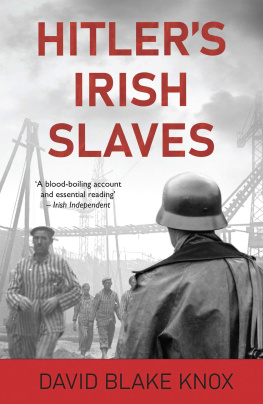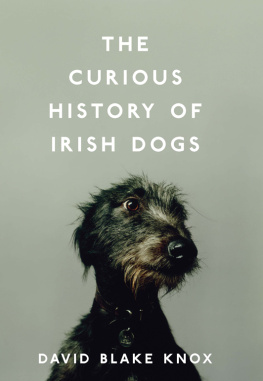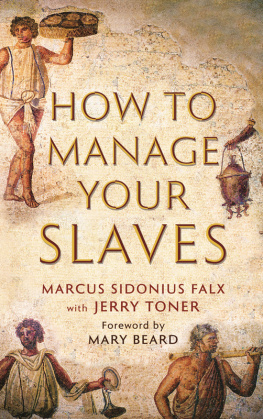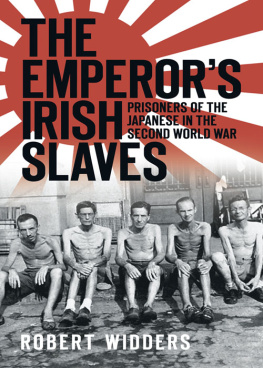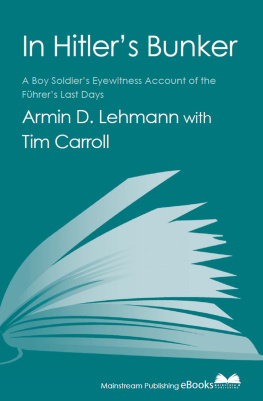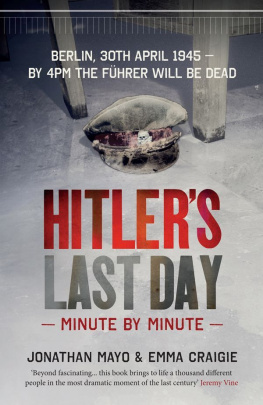
Hitlers Irish Slaves
Hitlers Irish Slaves
David Blake Knox
HITLERS IRISH SLAVES
First published in 2012 as SUDDENLY, WHILE ABROAD
This edition published in 2017 and reprinted 2021
by New Island Books
Glenshesk House
10 Richview Office Park
Clonskeagh
Dublin D14 V8C4
Republic of Ireland
www.newisland.ie
Copyright David Blake Knox, 2017
The author has asserted his moral rights in accordance with the provisions of the Copyright and Related Rights Act, 2000.
PRINT ISBN: 978-1-84840-596-7
EPUB ISBN: 978-1-84840-622-3
All rights reserved. The material in this publication is protected by copyright law. Except as may be permitted by law, no part of the material may be reproduced (including by storage in a retrieval system) or transmitted in any form or by any means; adapted; rented or lent without the written permission of the copyright owner.
British Library Cataloguing Data. A CIP catalogue record for this book is available from the British Library
New Island Books is a member of Publishing Ireland.
Front cover image of Bremen-Farge, showing construction of the U-boat bunker Valentin (Bundesarchiv).
For my mother and my father.
About The Author
Dr David Blake Knox has worked as a TV producer and executive for RT in Dublin, the BBC in London and HBO in New York. He established Blueprint Pictures, an independent production company, in 2002, which specialises in arts and entertainment series. He is the author of Ireland and the Eurovision, published by New Island in 2015, and The Curious History of Irish Dogs, published by New Island in 2017. David lives in Dublin.
Acknowledgements
Whatever faults or errors this book contains are, of course, my own responsibility, but there are a number of people who have greatly helped me to write it. I should like to thank Maurice Earls, the editor of the Dublin Review of Books, who first suggested to me that I write an article for that journal about the thirty-two Irish merchant seamen who were imprisoned in the Farge camp. Maurice also provided an extremely helpful critique of some of the chapters in this book. I want to thank Tom Inglis, of University College Dublin, who also read several chapters, and gave his usual perceptive commentary on them. I am grateful to my friend Robert Seidman, the writer and film producer, who brought an invaluable perspective to his reading of the book. I would like to thank both my daughters, Kirsty and Sarah, for the original research that they contributedas well as their critical comments. I am sure that I tested the patience of their mother, Deborah Spillane, in talking to her about this book while it was being written, and I am deeply grateful for her tolerance and understanding of my preoccupation. My son, Dr Jamie Blake Knox, was the first to read a complete draft of this book, and I am most appreciative of the many late-night discussions that we had about its contents, and for the shrewd historians eye that be brought to bear on the final text. Jamie travelled with me when I visited the main concentration camp at Neuengamme, and the Valentin Bunker at Farge. Dr Caoimhe Gallagher also travelled with us to Germany: her fluency in German is much superior to my own, and helped me to obtain some key documents, as well as (literally) opening doors for us. I should like to thank our guide at the Valentin Bunker, Ms Sandra Kern, who went to some trouble to facilitate our visit, and who was also most helpful in making archive photographs of the bunker available to me. I am indebted to Dr Reimer Mller, of the KZ-Gedenkstatte Neuengamme, for providing so much useful information about the trial of SS personnel in Hamburg in 1947. I am also grateful to Susan Hill, the Collection Access Officer with Southampton City Council, for her assistance in obtaining the records of some of the Irish merchant seamen who were held captive in the Farge Camp. I would also like to thank Harry Callan, the last Irish survivor of the Farge camp, for his hospitality and openness in talking to me about his experiences as a prisoner of the SS. I am very grateful to those relatives of the other prisoners who survived their incarceration in the labour camp who shared with me some of their family memories. In particular, I should like to thank Sophie OMahony, Christine Foley and Susan McKeon for the valuable information they provided. Finally, I should like to thank Edwin Higel for his encouragement and advice, and also my editors at New Island, Eoin Purcell, Justin Corfield and Dan Bolger. Eoin first approached me about the possibility of writing this book, and their comments and suggestions, as well as their encouragement, have been of great assistance.
Introduction
Why do people have memories? It would be easier to die
anything to stop remembering.
These words come from Vasily Grossman, a Soviet Russian author and front-line war journalist who visited Nazi concentration camps in the immediate aftermath of the Second World War. His comments reflect a response that was not uncommon among those who had been caught up in the horrors of that war. Others might argue that it is also time for the rest of us to forget. After all, the Second World War happened a long time ago, and since the vast majority of those who took part in it are now dead, perhaps it would be better to let them rest in peace.
I am more inclined to the view of Elie Wiesel, who survived Auschwitz, and thought that to forget all that had happened there and in similar Nazi camps was simply to kill the victims twice. I believe that we must continue to listen to the voices that emerged from that terrible conflict. The Second World War has cast far too long a shadow to be forgotten. It is a shadow that continues to fall beyond the children and grandchildren of those who fought in the war. Even if we wanted to forget the men and women who died or suffered in its cataclysm, their voices would still rise up and insist on being heard.
Benedetto Croce once wrote that all history is contemporary history, and his comment seems especially apt as far as Ireland is concerned. Irelands role in the Second World War is still able to generate heated controversy and division, and it is not hard to see why. On the one hand, Ireland was one of just five European states who were able to remain neutral throughout the duration of the war. On the other hand, tens of thousands of Irish men and women volunteered to join the Allied armed forces, and to engage in the struggle against fascism. That apparent contradiction can still inform, or cloud, Irish perceptions of the war.
This book tells the story of thirty-two merchant seamen from Ireland who were held in conditions of great hardship in an SS slave labour camp from 19431945. As the prosecuting counsel argued before a military tribunal after the war, The whole camp was illegal. Those workers were conscripted and brought to the camp [against their will], and that in itself [was] illegal. I believe that the imprisonment of these Irish seamen was not only unlawful, but could have been avoided. The Irishmen who were imprisoned in this labour camp near the village of Farge in north-west Germany may seem unlikely heroes of any story about the Second World War. They were all non-combatants, and none of them had volunteered for active service. The ships they served upon were not modern battleships, armed to the teeth with heavy guns, but were, for the most part, ageing freighters: slow, cumbersome, and without any adequate means of defence. Some of the Irish seamen were already in advanced middle age when they were taken prisoner. Regardless of their age, they were sent to a labour camp by the Gestapo, where they were subjected to years of a brutal and degrading regime. Despite that, and unlike some other Irishmen, they steadfastly resisted all attempts by the SS to turn them into collaborators with the Third Reich.
Next page
